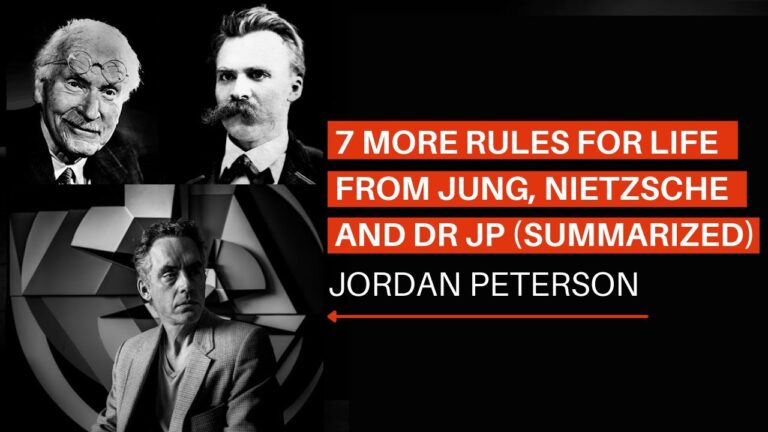Unraveling the Intricate Relationship Between Two Intellectual Titans
When it comes to the world of psychology, few figures have had as much impact as Carl Gustav Jung and Dr. Jordan Peterson. For those seeking to understand the human mind and the complexity of human behavior, the works of these two scholars provide a wealth of insight. This article aims to explore the profound connection between Jordan Peterson and Carl Jung, delving into their philosophies, their influences on each other, and their contributions to modern psychology.

Who Are Jordan Peterson and Carl Jung?
Carl Jung (1875-1961) was a Swiss psychiatrist and psychoanalyst who founded analytical psychology. His theories have influenced various disciplines, including anthropology, religious studies, and philosophy. Jung’s concepts of the collective unconscious, the psychological archetypes, and the process of individuation have had a significant impact on the field of psychology.
Jordan Peterson (born 1962) is a Canadian clinical psychologist, cultural critic, and professor of psychology at the University of Toronto. Peterson gained widespread recognition for his views on cultural and political issues, which he discusses in his books, lectures, and podcasts. He is best known for his book “12 Rules for Life: An Antidote to Chaos,” which draws heavily on Jungian psychology and classical mythology.
The Influence of Carl Jung on Jordan Peterson's Work
It is no secret that Jordan Peterson has been heavily influenced by the works of Carl Jung. He often cites Jung as one of the most critical thinkers in his intellectual development. The Jungian concepts that have had the most significant impact on Peterson’s work include:
The Collective Unconscious: According to Jung, the collective unconscious is a part of the psyche shared by all human beings, containing inherited memories, symbols, and archetypes. Peterson recognizes the importance of the collective unconscious in understanding human behavior and often uses it as a framework to explore cultural narratives and myths.
Archetypes: Archetypes are universal patterns or symbols present in the collective unconscious. They have a significant influence on human behavior and can be found in various cultural expressions, such as myths, legends, and religious texts. Peterson often discusses the role of archetypes in shaping individual and societal values.
Individuation: Jung’s process of individuation is the journey of self-discovery and personal growth. This process involves integrating the conscious and unconscious aspects of the psyche, ultimately leading to the development of a unique, authentic self. Peterson views individuation as a crucial component of self-improvement and personal development.
Jordan Peterson's Contributions to Jungian Psychology
While Jordan Peterson has built upon Carl Jung’s work, he has also made significant contributions to the field of Jungian psychology. Some of these contributions include:
Practical Application: Peterson’s “12 Rules for Life” offers practical advice for individuals to navigate the complexities of life, drawing on Jungian concepts and other psychological theories. These rules provide a framework for personal growth and self-improvement, allowing individuals to better understand and integrate their unconscious.
Cultural Analysis: Peterson’s work often involves analyzing cultural phenomena and political issues through the lens of Jungian psychology. His critiques of postmodernism, political correctness, and identity politics have sparked intense debate and discussion, furthering the reach and impact of Jungian ideas.
Bridging the Gap: Peterson has played a vital role in introducing Jungian concepts to a broader audience, making these ideas more accessible and relevant to contemporary society. His use of YouTube, podcasts, and social media has allowed him to engage with millions of people worldwide, fostering greater interest and understanding of Jungian psychology.
The Lasting Impact of Jung and Peterson on Modern Psychology and Society
The profound connection between Carl Jung and Jordan Peterson has had a lasting impact on modern psychology and society. Their ideas and contributions have influenced countless individuals and reshaped the way we understand human behavior, culture, and personal development. Some of the most significant impacts include:
Expanding Psychological Theory: Jung’s groundbreaking ideas on the collective unconscious, archetypes, and individuation have enriched our understanding of the human psyche. Peterson’s contributions to Jungian psychology and his practical application of these concepts have further expanded and contextualized these ideas for a contemporary audience.
Promoting Self-Improvement: Both Jung and Peterson emphasize the importance of self-discovery and personal growth. Through their work, they encourage individuals to embark on the journey of individuation, ultimately leading to the development of a more authentic, integrated self.
Encouraging Critical Thinking: The work of both Jung and Peterson has inspired countless individuals to engage in critical thinking and intellectual exploration. By analyzing cultural phenomena and political issues through the lens of Jungian psychology, Peterson has sparked debate and discussion, encouraging individuals to challenge conventional narratives and seek a deeper understanding of the world around them.
Fostering Interdisciplinary Dialogue: Jung’s work has influenced a wide range of disciplines, including anthropology, religious studies, and philosophy. Peterson’s engagement with these fields, as well as his integration of mythology, literature, and political theory, has contributed to a rich interdisciplinary dialogue that broadens our understanding of human experience.
Conclusion
The profound connection between Jordan Peterson and Carl Jung is a testament to the enduring relevance and impact of their ideas. By building upon Jung’s groundbreaking work and introducing these concepts to a broader audience, Peterson has contributed to a renewed interest in Jungian psychology and its applications in our modern world. As we continue to explore the complexities of the human mind and the challenges we face as individuals and societies, the insights of these two intellectual titans will undoubtedly remain invaluable.
